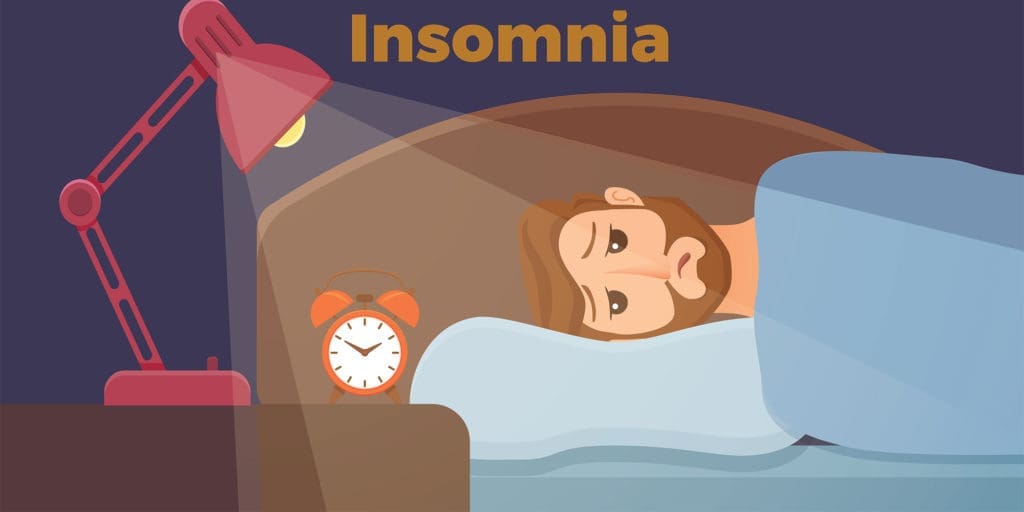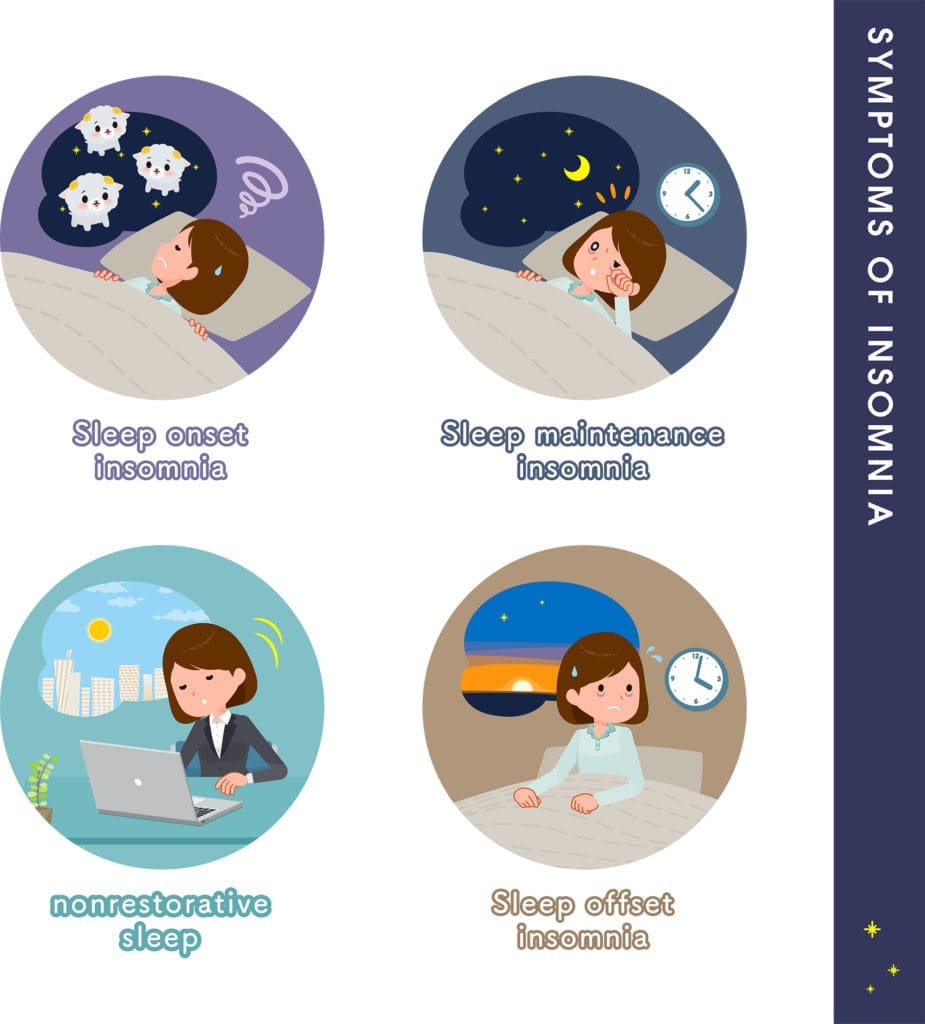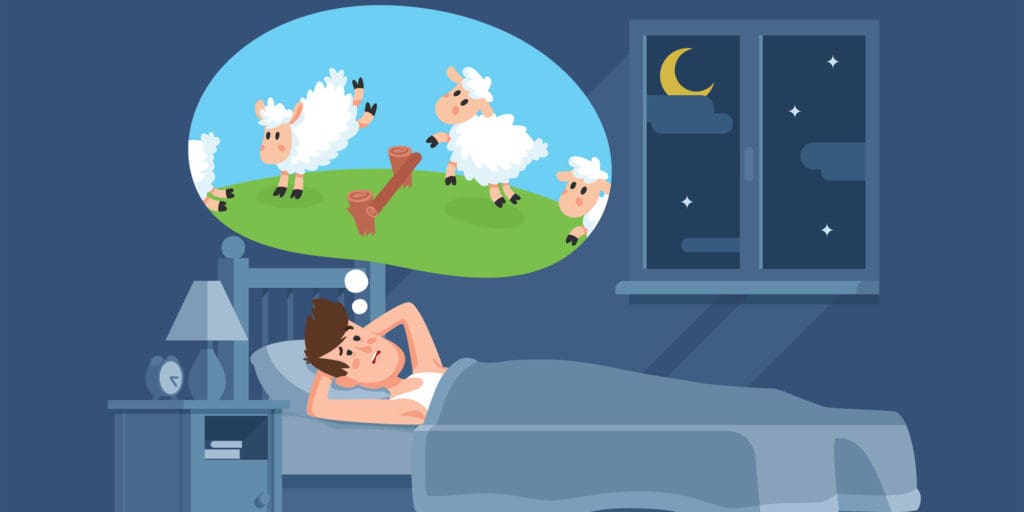For many, insomnia can be a tough condition to live with. Fortunately, insomnia can be a very treatable condition, and we’re here to tell you how to end those sleepless nights and to figure your original question, “Why Can’t I Sleep At Night?”.
What is Insomnia?
 Insomnia is a condition in which an individual has difficulty either falling or staying asleep. The American Academy of Sleep Medicine defines insomnia as “persistent difficulty with sleep initiation, duration, consolidation or quality.” Insomnia can be both acute and chronic, occurring anywhere from one night to several months, and will oftentimes become a chronic condition; which is described as characterized by symptoms that occur at least three times per week for at least three months. Recent studies estimate that between 9% and 20% of adults in the United States suffer from some form of insomnia.
Insomnia is a condition in which an individual has difficulty either falling or staying asleep. The American Academy of Sleep Medicine defines insomnia as “persistent difficulty with sleep initiation, duration, consolidation or quality.” Insomnia can be both acute and chronic, occurring anywhere from one night to several months, and will oftentimes become a chronic condition; which is described as characterized by symptoms that occur at least three times per week for at least three months. Recent studies estimate that between 9% and 20% of adults in the United States suffer from some form of insomnia.
There are many different possible causes of insomnia, ranging from health conditions such as hyperthyroidism or other endocrine problems to mental health issues like stress or anxiety. Nearly all of the causes of insomnia can be attributed to one of two types: sleep-onset insomnia and sleep maintenance insomnia. Both types affect an individual’s ability to obtain a sound night’s sleep but can disrupt the sleep cycle in different ways.
Sleep Onset Insomnia vs. Sleep Maintenance Insomnia
Sleep-onset insomnia is a type of insomnia that refers to an individual’s ability to fall asleep. This type of insomnia typically occurs in people who suffer from difficulty relaxing in bed, such as individuals with anxiety, and will often occur as a result of a circadian rhythm that has been disrupted, such as in the case of jet lag or irregular work schedules.
Insomnia is most often associated with difficulty falling asleep (sleep-onset insomnia), but it can also manifest as the inability to stay asleep. Sleep maintenance insomnia refers to an individual who may have difficulty staying asleep for any amount of time. Sleep maintenance insomnia typically occurs in older individuals, or in individuals who use substances that can interfere with the circadian rhythm, such as caffeine or tobacco, before trying to sleep. While most individuals will experience, on average, about two to three ‘wake-ups’ during a single night’s sleep, sleep maintenance insomnia can cause an individual to experience wake-ups more frequently, as well as difficulty falling back into sleep.
Why Can’t I Sleep At Night? – Symptoms of Insomnia


A rough night’s sleep is common for just about every individual at some point in their lives, however, insomnia can persist for months or even years at a time. Understanding the signs and symptoms of insomnia can be a useful tool in diagnosing insomnia, and potentially putting an end to sleepless nights.
Some common symptoms of insomnia can include the following.
- Difficulty sleeping or falling asleep at night
- Frequently wake-ups throughout the night
- Waking up too early
- Feeling tired or not well rested after a night’s sleep
- Depression, anxiety, or irritability
- Continuously worrying about sleep or quality of sleep
- Frequent accidents or errors
- Difficulty paying attention, remembering tasks, or focusing
- Feeling tired during the day
Why Can’t I Sleep At Night? Treatments and Prevention


Acute Insomnia
For cases of acute insomnia, small, in-home changes can be useful in improving both the quality and duration of an individual’s sleep. For many, acute insomnia may never result in a trip to the doctor, as most may find relief with simple over-the-counter drugs, or avoidance of certain triggers can prove to be effective. The key to treating insomnia in-home lies in the changes to both one’s daily routine and sleep schedule.
Treating acute insomnia can include, but is not limited to, the following.
- Limiting or eliminating naps, especially late in the day
- Avoiding substances such as alcohol, tobacco, and caffeine within four hours of going to sleep
- Maintain a consistent bedtime and wake-up time, even on weekends
- Avoiding eating meals late in the evening or at night
- Maintain a healthy diet and exercise regimen
- Ensure any medications unrelated to insomnia are not in conflict with the sleep schedule
- Over-the-counter medications such as melatonin and valerian can be useful, although it is important to consult with a doctor before starting any type of medication
- Avoid ‘clock-watching’ throughout the night, try turning off or covering clocks in the bedroom
- White noise machines or other background noises have proven to be effective in calming anxiety
- Avoid using the bedroom for activities other than sleep and sex
Chronic Insomnia
When insomnia with symptoms that occur at least three times per week, or lasts for longer than three months, is categorized as chronic insomnia. Chronic insomnia can be severe, and oftentimes difficult to live with. This type of recurring insomnia is often broken into two categories: primary and secondary. Primary chronic insomnia is insomnia that is not linked to any health conditions, whereas secondary chronic insomnia is caused by a health condition such as asthma or sleep apnea.
For the majority of individuals with chronic insomnia, more serious measures such as therapies and prescription medications may be necessary to improve one’s condition.
Primary chronic insomnia, as previously mentioned, is insomnia that has no known cause. This type of insomnia is often associated with behavioral or mental problems, such as severe anxiety or restlessness. For cases of primary insomnia, cognitive behavioral therapy (CBT) has shown to be useful. CBT involves educating an individual on better, healthy sleep habits, that can change the behaviors that interfere with sleep and staying asleep. CBT often involves processes such as journaling, relaxation techniques such as acupuncture or yoga, sleep restriction, and even paradoxical treatments such as focusing on staying awake to reduce anxiety.
Other possible treatments for primary insomnia can include medications such as zolpidem (Ambien) or eszopiclone (Lunesta) and other behavioral therapies aimed at relieving the anxiety or stress associated with sleeplessness.
Cases of secondary insomnia can oftentimes be treated by treating the underlying condition that causes insomnia. For example, individuals with severe asthma may experience insomnia, as the chronic coughing and wheezing associated with asthma may keep an individual awake for long durations, leading to insomnia. Treating the secondary causes of insomnia may help alleviate symptoms associated with sleeplessness, and can help improve the overall quality and duration of sleep.
Bottom Line
So, Why Can’t I Sleep At Night? – Whatever the cause, insomnia, whether chronic or acute, can be a difficult condition to live with. Nobody enjoys a sleepless night, especially when it becomes a regular occurrence. If symptoms persist, or if home treatments aren’t effective. Talk with a doctor about specific insomnia treatments that may be right for your specific condition.
What Questions Do You Have About Insomnia?
Tell us in the comments section below!
What topics should we cover next?
Email us at info@painresource.com with your ideas.
Are you on Facebook?




